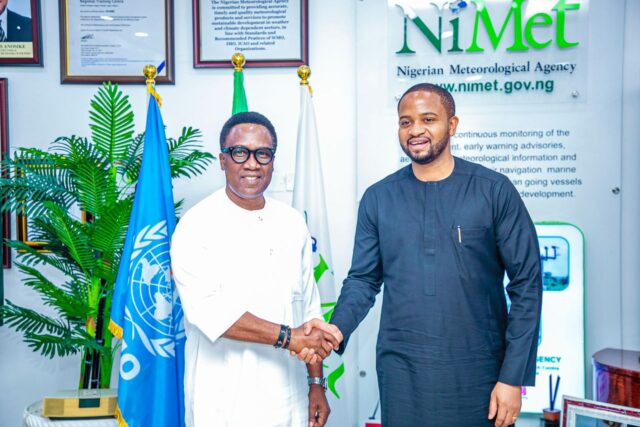Managing Director of the South-East Development Commission (SEDC), Mr. Mark Okoye, paid a courtesy visit to Director General and Chief Executive Officer of the Nigerian Meteorological Agency (NiMet), Professor Charles Anosike.
The visit aimed to strengthen inter-agency cooperation and establish a climate disaster preparedness partnership focused on Nigeria’s South-East region.
Mr. Okoye reiterated President Bola Ahmed Tinubu’s commitment to regional development through the creation of SEDC and similar institutions. He stated that the Commission was set up to coordinate and implement efforts for rebuilding, rehabilitation, and improving infrastructure in the South-East.
He also emphasized tackling ecological and developmental challenges faced by the region. Mr. Okoye expressed his interest in exploring possible partnerships with NiMet to promote climate-resilient development.
Focus on Risk Reduction and Resilience
According to Mr. Okoye, it is important to de-risk economic sectors in the region through targeted intervention programmes. He explained that these interventions would be better achieved through collaboration with relevant institutions such as NiMet.
In response, Professor Anosike outlined the activities NiMet has undertaken in support of regional development. He noted that NiMet has worked with the North-East Development Commission and is willing to replicate such efforts with SEDC.
He stressed the need to identify vulnerabilities in the South-East and tailor mitigation strategies that will help communities adapt to risks.
NiMet’s Role in Supporting Communities
Professor Anosike explained that NiMet has expertise and scientific tools to address the South-East’s climate-related vulnerabilities. These include flash floods, soil erosion, heavy rainfall, and other hazards caused by weather changes.
He highlighted the value of NiMet’s evidence-based products in helping vulnerable communities adapt and improve livelihoods.
He also proposed the downscaling of the Seasonal Climate Prediction (SCP) as a practical step. This would support climate-smart agriculture and contribute to sustainable food production in line with national initiatives.
Improving Access to Climate Information
Professor Anosike further noted that sensitisation and advocacy are essential. He stated that efforts should focus on bridging information gaps in local communities. According to him, such efforts would enable better decisions for productivity, livelihood protection, and sustainable growth.
The discussion concluded with both leaders agreeing to work together through a formal agreement.
They reached a consensus to immediately initiate a Memorandum of Understanding (MoU). This will guide the climate disaster preparedness partnership and help both agencies achieve their objectives.
The collaboration is expected to enhance planning, reduce climate-related risks, and improve the effectiveness of public-sector interventions in the South-East.






















